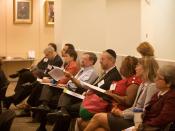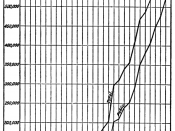prof. really liked it thought it was well written, thorough
Nelson, J.L., Carlson, K., & Palonsky, S.B. (1993). Private schools: Essential or
undemocratic. In Critical issues in education (pp. 63-78). New York: McGraw-Hill,
Inc.
The first position of chapter three is supportive of private schools. This position
feels that private schools prevent the public schools from having a total monopoly over
education by offering the community an alternative choice. This choice also produces
competition with public schools for student enrollment. This position views public schools
as something a student must accept as the only option if his or her parents can not afford a
private school education. This is an obvious short coming to private schools, since they
do not operate on the taxpayers' funds. However, some private schools do provide
scholarships to poorer families. However, one distinct advantage of private schools is
their abilities to satisfy their students' special needs.
A military academy, for example,
provides the strict discipline that some students need. Basically, a private school works
for the students' desires, while a public school demands that its students work for their
designated needs. The intellectual climate at a private school is more academically
oriented than public schools. Private education provides students with a broader
education that accepts diversity. Public education, however, does not have as much
diversity due to strict public control that tries to avoid offending others. Private schools
are considered to be more experimental because they try and accept new ideas faster. The
American public generally seems to support private education, according to this position.
The second position of chapter three favors public schools. This position feels that
private schools are an unnecessary burden and expense to the public. Private schools have
the tendency to tarnish the image and reputations of good public...


